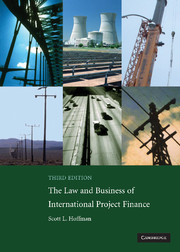 The Law and Business of International Project Finance
The Law and Business of International Project Finance from PART FIVE - PROJECT FINANCE DOCUMENTATION
Published online by Cambridge University Press: 05 June 2012
GENERALLY
Facts are important in any business transaction. In a project financing, however, an understanding of the details of a project is crucial to proper structuring of each of the project contracts and the financing arrangements. Any unverified fact is the potential weakness of a project, for uncertain facts may lead to unpredictable results.
In contracts, facts are traditionally memorialized in the representations and warranties section. It is here that the contracting parties in a project financing can determine whether the elements necessary to support a project financing exist. Thus, the representation and warranty section of project contracts, including the project loan agreement, serves an important role in the project due diligence process.
Definition
Representations and warranties form the basis of most business transactions, including a project financing. A representation is a statement by a contracting party to another contracting party about a particular fact that is correct on the date when made. A representation is made about either a past or a present fact but never a future fact. Facts required to be true in the future are covenants.
A warranty is sometimes confused with a representation, but in practice, the two terms are used together, the contracting party being asked to “represent and warrant” certain facts. As an oversimplification, a warranty is a duty created in a contract; a representation induces a party to enter into a contract and can exist even though no valid contract is created. A contractual warranty, therefore, is a guarantee that a given fact will exist as warranted at some future date.
To save this book to your Kindle, first ensure no-reply@cambridge.org is added to your Approved Personal Document E-mail List under your Personal Document Settings on the Manage Your Content and Devices page of your Amazon account. Then enter the ‘name’ part of your Kindle email address below. Find out more about saving to your Kindle.
Note you can select to save to either the @free.kindle.com or @kindle.com variations. ‘@free.kindle.com’ emails are free but can only be saved to your device when it is connected to wi-fi. ‘@kindle.com’ emails can be delivered even when you are not connected to wi-fi, but note that service fees apply.
Find out more about the Kindle Personal Document Service.
To save content items to your account, please confirm that you agree to abide by our usage policies. If this is the first time you use this feature, you will be asked to authorise Cambridge Core to connect with your account. Find out more about saving content to Dropbox.
To save content items to your account, please confirm that you agree to abide by our usage policies. If this is the first time you use this feature, you will be asked to authorise Cambridge Core to connect with your account. Find out more about saving content to Google Drive.